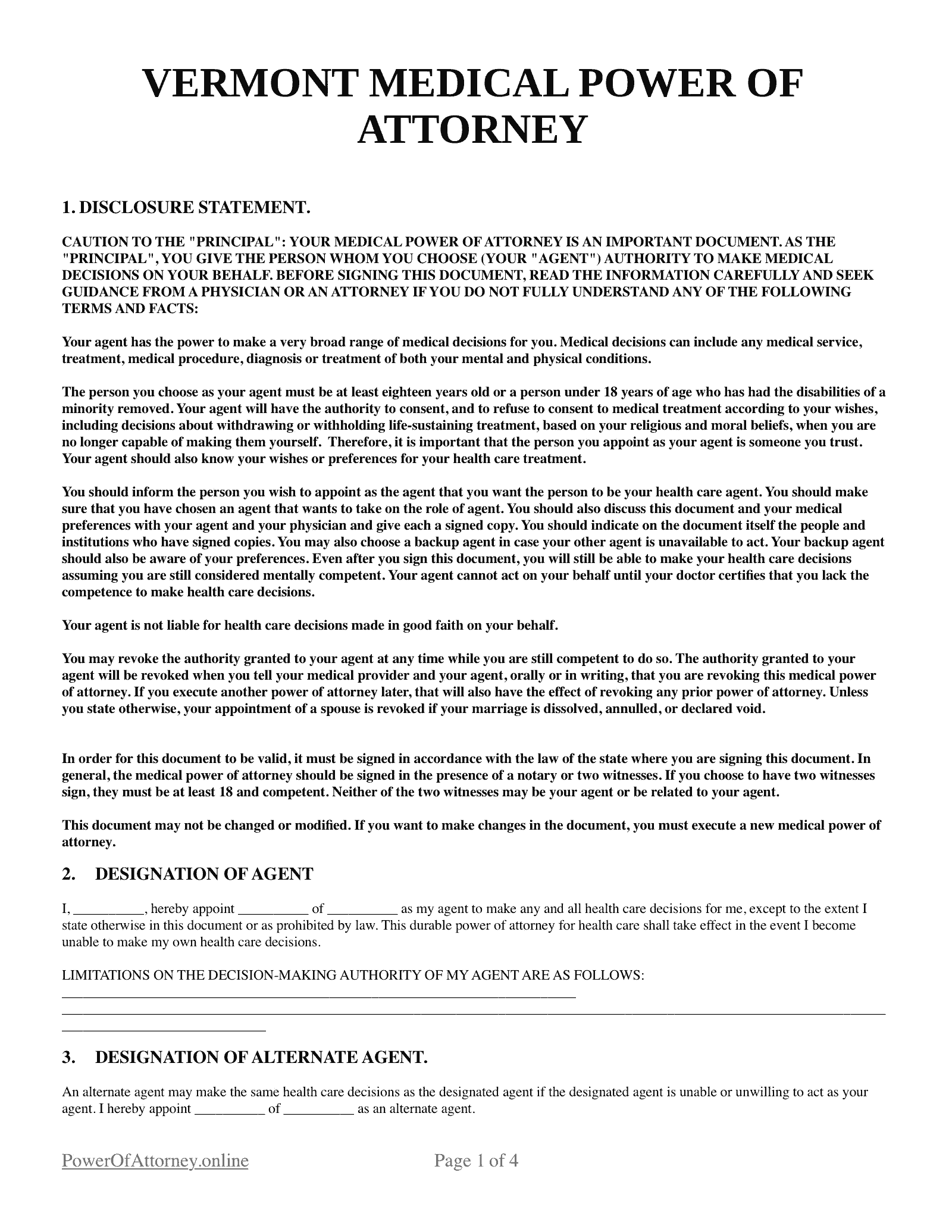Free Vermont Medical Power of Attorney Forms
A power of attorney (POA) is a legal document that allows a person to decide on behalf of another. The person making decisions is called the agent or attorney-in-fact, while the person bestowing the authority is called the principal.
One type of POA is the medical POA. It specifically allows an agent to make medical and healthcare-related decisions for the principal. This may include which medications, treatments, surgeries, procedures, and end-of-life care arrangements the principal receives.

Vermont Medical Power of Attorney Laws
The Advance Directives and Disposition of Remains is a provision of The Vermont Statutes Title 18: Health. The chapter discusses guidelines for creating a medical POA. It states that the advance directive becomes effective upon execution.
The law also states: “Identify those persons whom the principal does not want to serve as his or her decision-maker, or those adults or minors with whom the agent shall or shall not consult or to whom the agent is or is not authorized to provide information regarding the principal’s health care” (18 V.S.A. § 9702).
Signing Requirements in Vermont
The POA acts as an agent or healthcare proxy’s written permission to decide for the principal on matters of medical care. To make it legal and binding, the principal must specify the details of the arrangement and sign the POA.
The signing of the document must also be witnessed by at least two individuals who are of legal age.
According to The Vermont Statutes Title 18: “Neither the agent appointed by the principal nor the principal’s spouse, parent, adult sibling, adult child, or adult grandchild may witness the advance directive” (18 V.S.A. § 9703).
How To Write a Medical POA in Vermont
The steps to creating a medical POA in Vermont are quite simple.
1. Choose a person you can trust as an agent
The role of an agent in a medical POA is crucial because the person will be responsible for making decisions regarding your medication, treatment, procedures, and other health-related matters. The right agent will not only decide what’s best for you should you be declared mentally incompetent but must also act according to your wishes.
In most cases, principals choose a family member to become an agent. It could be their spouse, child, sibling, or parent. The most vital thing is you trust them with your life. You can also choose someone who is not related by blood for a more impartial, rather than emotional, decision-making process.
2. Discuss the Medical POA with your chosen agent
An agent is sometimes referred to as a healthcare proxy because the person will make medical-related decisions on your behalf. To ensure that they do what you wish, talk to them at length. Discuss different medical scenarios with them and how you want them handled in case you become mentally incapacitated.
One of the most important issues to bring up is your end-of-life care. You may want to specify how and where you want to live should the time occur when you can no longer make decisions for yourself.
You may also want to mention which medical procedures you’d like to undergo or avoid. The agent will be acting on your behalf, so they must be thoroughly familiar with your preferences.
3. Download the Vermont Medical POA Template
For your convenience, you can download a printable Vermont medical POA online. Make sure the template is acceptable in Vermont as every state has different POA requirements. Fill out the form and make sure to include all the instructions that you discussed with your agent. It’s best to put everything down in writing.
4. Sign the Medical POA in Vermont
Double-check all the details of the POA and make sure you didn’t miss anything. Once you are satisfied with it, sign and date the document. To make the document legal, it must be signed by at least two witnesses. The agent cannot sign as a witness.
5. Use the Medical POA in Vermont
The document can now be used. Even if you are still fully capable of making decisions, you can already pass the responsibilities on to your agent, who should have a copy. The document must be presented every time the agent acts on your behalf.